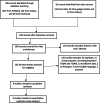What is the effect of mobile phone text message reminders on medication adherence among adult type 2 diabetes mellitus patients: a systematic review and meta-analysis of randomized controlled trials
- PMID: 36658577
- PMCID: PMC9850787
- DOI: 10.1186/s12902-023-01268-8
What is the effect of mobile phone text message reminders on medication adherence among adult type 2 diabetes mellitus patients: a systematic review and meta-analysis of randomized controlled trials
Abstract
Background: Globally, type 2 diabetes has become increasing. As little is known about the effect of educational intervention on this population, this systematic review and meta-analysis evaluated the effectiveness of mobile phone text message reminders versus usual care to improve medication adherence among type 2 diabetes mellitus patients.
Methods: PubMed, Google Scholar, Cochrane Library, Scopus, and African Journals Online, were searched. A random-effects model was employed to estimate combined effect sizes. Subgroup analyses were employed to investigate possible sources of heterogeneity between studies. The overall certainty of the evidence was evaluated using the Grading of Recommendations Assessment, Development, and Evaluation approach.
Results: A total of 9 trials with 1,121 participants were included in the review. The pooled estimated impact of mobile phone text message reminders on medication adherence was (SMD: 0.36; 95%CI; 0.14, 0.59) compared to usual care groups among patients with type 2 diabetes mellitus. In addition, subgroup analyses revealed greater medication adherence levels in those studies with intervention durations of more than six months and with self-report/refill adherence scale measurement (SMD: 0.21; 95%CI: 0.02, 0.40) and (SMD: 0.45; 95%CI: 0.22, 0.68), respectively.
Conclusion: Mobile phone text messages can potentially lead to improved medication adherence levels in patients with Type 2 diabetes despite heterogeneity across the studies. Therefore, mobile phone text messaging when delivered in addition to usual care, have the potential to produce significant improvements in medication adherence.
Keywords: Medication adherence; Mobile phone text message; Type 2 diabetes.
© 2023. The Author(s).
Conflict of interest statement
The authors declare that they have no competing interests.
Figures







Similar articles
-
The effectiveness of short mobile phone text message reminders compared to usual care on medication adherence in patients with hypertension: a systematic review protocol.Syst Rev. 2024 Feb 5;13(1):53. doi: 10.1186/s13643-023-02394-z. Syst Rev. 2024. PMID: 38317254 Free PMC article.
-
Effectiveness of mobile phone text message reminder interventions to improve adherence to antiretroviral therapy among adolescents living with HIV: A systematic review and meta-analysis.PLoS One. 2021 Jul 22;16(7):e0254890. doi: 10.1371/journal.pone.0254890. eCollection 2021. PLoS One. 2021. PMID: 34293033 Free PMC article.
-
A systematic review and meta-analysis in the effectiveness of mobile phone interventions used to improve adherence to antiretroviral therapy in HIV infection.BMC Public Health. 2019 Jul 9;19(1):915. doi: 10.1186/s12889-019-6899-6. BMC Public Health. 2019. PMID: 31288772 Free PMC article.
-
Mobile Telephone Text Messaging for Medication Adherence in Chronic Disease: A Meta-analysis.JAMA Intern Med. 2016 Mar;176(3):340-9. doi: 10.1001/jamainternmed.2015.7667. JAMA Intern Med. 2016. PMID: 26831740 Review.
-
Effect of Mobile Phone Text Message Reminders on the Completion and Timely Receipt of Routine Childhood Vaccinations: Superiority Randomized Controlled Trial in Northwest Ethiopia.JMIR Mhealth Uhealth. 2021 Jun 15;9(6):e27603. doi: 10.2196/27603. JMIR Mhealth Uhealth. 2021. PMID: 34128813 Free PMC article. Clinical Trial.
Cited by
-
Impact of an SMS intervention to support type 2 diabetes self-management: DiabeText clinical trial.Br J Gen Pract. 2025 Jun 26;75(756):e457-e465. doi: 10.3399/BJGP.2024.0206. Print 2025 Jul. Br J Gen Pract. 2025. PMID: 39362693 Free PMC article. Clinical Trial.
-
Influencing factors of health promotion behaviour in patients with aortic dissection: a qualitative study using the COM-B model.BMJ Open. 2025 Mar 5;15(3):e076181. doi: 10.1136/bmjopen-2023-076181. BMJ Open. 2025. PMID: 40044200 Free PMC article.
-
Improving the management of type 2 diabetes in China using a multifaceted digital health intervention in primary health care: the SMARTDiabetes cluster randomised controlled trial.Lancet Reg Health West Pac. 2024 Jul 3;49:101130. doi: 10.1016/j.lanwpc.2024.101130. eCollection 2024 Aug. Lancet Reg Health West Pac. 2024. PMID: 39056088 Free PMC article.
-
Oral self-management of palbociclib using mobile technology: Findings from a nurse-led randomized controlled trial.Asia Pac J Oncol Nurs. 2024 Oct 15;11(12):100604. doi: 10.1016/j.apjon.2024.100604. eCollection 2024 Dec. Asia Pac J Oncol Nurs. 2024. PMID: 39697813 Free PMC article.
-
Intention to use mobile text message reminders for medication adherence among hypertensive patients in North West Ethiopia: a cross-sectional study.BMC Health Serv Res. 2024 Nov 22;24(1):1451. doi: 10.1186/s12913-024-11794-3. BMC Health Serv Res. 2024. PMID: 39578837 Free PMC article.
References
-
- World Health organization GroD, Geneva, 2016. Accessed 30 August 2016.
-
- International diabetes federation. IDF Diabetes Atlas teB, Belgium: International Diabetes Federation. 2015. .
Publication types
MeSH terms
LinkOut - more resources
Full Text Sources
Medical
Research Materials

